Super start-up: The team behind Kindship, the app changing lives of parents of children with disabilities
Despair and loneliness are just some of the impacts facing parents of children with special needs. Meet the team behind the first app of its kind to connect and support them.
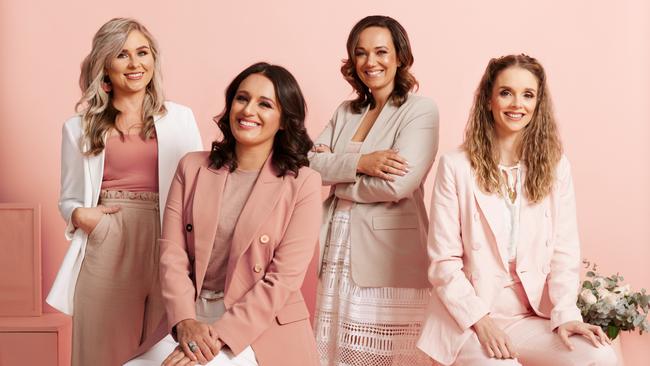
SA Weekend
Don't miss out on the headlines from SA Weekend. Followed categories will be added to My News.
An Adelaide-based start-up has received $350k in state government seed funding to build a business supporting one of society’s most isolated groups – parents of children with a disability.
Adelaide founder Summer Petrosius has big plans for Kindship – the first social networking app built with and exclusively for parents raising children with a disability in Australia – and is hoping to grow the team from 16 to more than 150 over the next few years.
They’ve this year received a $360,000 South Australian government grant to launch and scale their business under the Seed-Start program.
The app already has 800 parents using it, with most spending about an hour a week connecting with other parents and supports.
Petrosius says they’ll use the funding to help with the national launch and scale of their app, with the company’s first objective to reach 10,000 active weekly users by year’s end.
This is the story of how it all came to life:
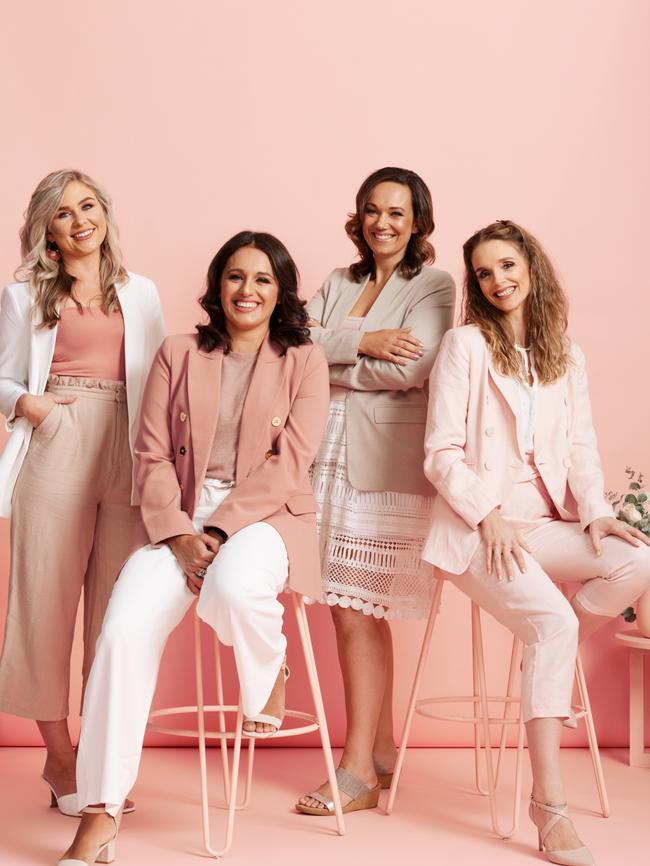
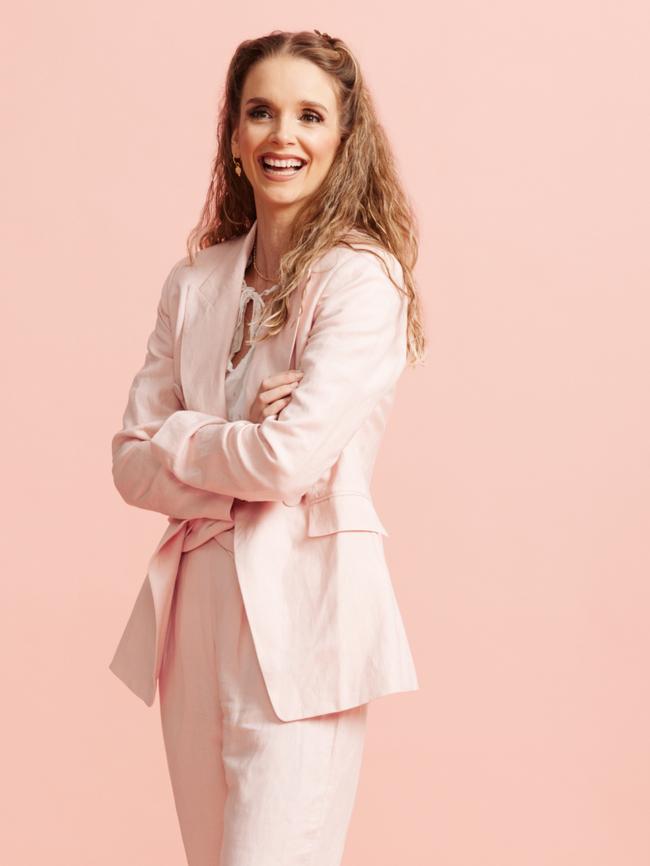
Summer Petrosius was working as a speech pathologist at a school for kids with severe autism in Sydney when she noticed a common thread among the parents: They felt really, really alone. She would often spend hours talking to them before and after school.
“They were incredibly isolated and that had massive impacts on their wellbeing and also their family’s wellbeing,” Petrosius says.
“I’d talk to them at the school gate, or on the phone, just about what was happening at home, because they just didn’t have anybody else who really understood their children.
“And I was very conscious of the fact that despite being as empathetic as I possibly could be, I didn’t know what it meant to take their child home at the end of the day, and what it could mean to those families if they could speak to somebody that did.”
So the seed of an idea was sown: What if she could connect parents with a like-minded community that all had lived experience of those issues. What if she could help break down these feelings of loneliness and isolation? What if she could make a change that could really help?
From there the work started. Petrosius, a 2019 Winston Churchill Fellow, knew that for it to be meaningful, it had to be designed by parents. And there could be no shortcuts.
“I started off by interviewing 500 parents from around the world who had children with all sorts of different diagnoses and experiences just to see what their challenges were in life and the ups and downs that they experienced and what a solution could look like,” she says.
She soon found a common thread.
“It sort of proved the assumption that I had around the incidents of loneliness and social isolation,” she says.
“I would say that for three, if not four out of five parents that was a massive part of their life, and not just a couple of weeks of feeling lonely but quite dark periods for them.
“The thing that stood out to me about that was it wasn’t actually the child that they felt was responsible for that loneliness. It was more of the societal barriers that prevented them as a family from being able to access social opportunities.”
Fortunately her husband Andrius knew a thing or two about emerging technology and had been building apps and websites since his teens. They moved to Bulgaria, of all places, to concentrate on the work (Andrius is Lithuanian and it proved to be cheaper than shifting interstate).
“I didn’t even know where it was on the map when I got on the plane,” Petrosius says with a laugh. “It was an interesting experience, but it was a fun one.”
From there, they engaged 200 parents in a co-design group and their bold new plan began to come to life, creating a new social networking app for parents of children with a disability.
“Then last year, actually in about December, we realised that we’d built a beautiful looking social networking technology, but we didn’t necessarily know what it took to make a community heartbeat,” she says. “So we invited Sandy and Steph to join us as co-founders.”
That’s Sandy Golder and Steph Wicks, who had been running a grassroots Facebook site for parents with children with disabilities for a number of years out of NSW.
Both have daughters on the autism spectrum and Petrosius herself has a diagnosis of autism. (Autism is a spectrum condition which basically means it varies widely in terms of severity. But there are some common threads such as difficulties with social interaction and communication, repetitive behaviours and heightened sensory sensitivities.)
“We realised if we could combine efforts, we could probably do something really amazing together,” she says.
With the additional help of co-founder Tara Thompson, Kindship (pronounced Kind-ship) was born and, with it, the first social networking app built with and exclusively for parents raising children with a disability in Australia.
DEPRESSING NUMBERS
Sandy Golder was shocked when she read an article about the impact on parents who cared for a child with a disability. Higher mortality rates. Higher rates of depression and illness.
The 2021 Carer Wellbeing Survey by Carers Australia shows carers of children with a disability are three times more likely to regularly experience loneliness; 35 per cent often or always feel lonely, compared with 11 per cent of the general population.
Almost half (44 per cent) of those caring for a person with high assistance needs, autism spectrum disorder, a development disorder, mental illness or intellectual disability, were frequently lonely.
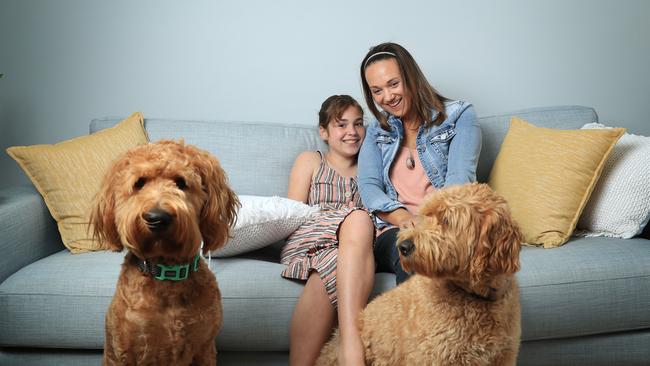
Golder felt it deeply because her daughter, Imogen, had been diagnosed with autism and she herself was no stranger to feelings of despair, or loneliness.
Friends were well-meaning, but didn’t really get it. Options for the future were both unclear and a little overwhelming.
So appalled was she by the stats, and the fact no one was talking about it, she did a Facebook live event highlighting the issue.
It went viral.
“And I was contacted by hundreds of parents from across the world saying ‘I’m living those statistics’,” she says.
From there, she launched an online community with good friend Wicks – Thrive Tribe & Co, now more than 5000 strong – where parents of children with a disability could connect, build networks, get information, support each other.
Golder says it’s difficult to quantify the difference it has made to people’s lives.
“I think just being surrounded by a group of people who just get it makes such a difference. You can talk about your day and not have to filter,” she says.
“It’s a community of people who just understand and you don’t have to explain. You’re not getting judged by other people.”
And she admits she could have used such a network herself when Imogen, now 11, was first diagnosed.
“I think isolation for me, in the beginning, was a really big pain point,” she says.
“Our daughter had some, you know, quite dangerous behaviours in the community, which meant that we couldn’t go to barbecues with our friends. We couldn’t even go to a friend’s house. If we did, I’d need to call beforehand and they’d have to pack up the pantry and remove all the stuff around that they didn’t want broken.
“ … It sucks enough when you can’t go to things or you can’t access things that other people can but then they have to deal with people’s thoughts around that is really, really challenging.
“Like I have one friend now where I can go to her house.
“I have other friends, but we talk online or on the phone but some of my best friends now are people I’ve met through the space. People who just get it make such a massive, positive impact.”
With the online community starting to grow, Golder got to know the speech therapist at her daughter’s school who, like her, had a keen interest in connecting parents, breaking down barriers and being proactive.
Alongside her husband she was working on a concept to change the dial. An idea that sounded pretty interesting.
Her name: Summer Petrosius.
NAMING RIGHT
“We took the words kindness, friendship and kinship and put them together to make up our own words. So that’s where it comes from,” Petrosius, now the group’s chief executive, says.
Petrosius says her own experience, and that of her parents, has also helped guide her mission, at least to a point.
“Retrospectively I can see that there were a lot of things that popped up for me as a child, but autism just wasn’t part of my family’s dictionary or anybody around us,” she says.
“I think if they had been able to connect with a community of people who maybe could have made the topic of autism and neurodiversity a little less scary, that they might have got support and then I might have got support, and life could have looked a little bit different.
“I mean, I’m quite proud of myself for where I’ve got to but, you know, it’s sort of been a very solo journey.
“So yeah, it’s curious to think back to what that might have looked like.”
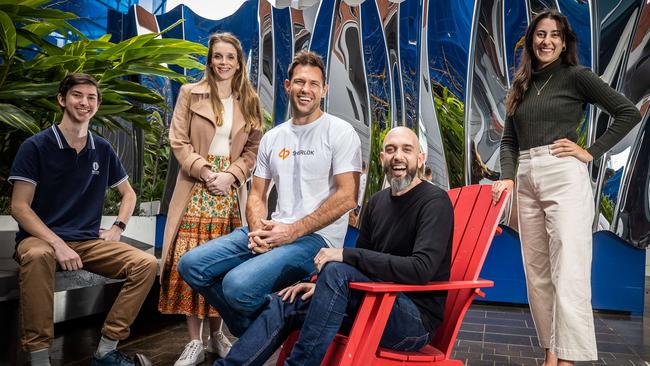
Petrosius recalls challenging times while at school; social situations were often difficult and reading body language or understanding emotions particularly tough.
“I was actually awarded twice the Miss Congeniality Award at my school because people thought I was so curious about their emotional state,” she says, laughing.
“I was probably being selfish and trying to figure it out for myself.”
Kindship is clearly a melting pot of her experiences, those of Golder and Wicks, and the thousands of parents with whom they’ve come into contact over the years.
The key now, Petrosius says, is to give these parents something they’ve long lacked: a sense of taking back control of their lives.
“The other thing that really inspires me is, when I was working as a speech pathologist I found that I was often deferring to parents when it came to, you know, what were their favourite therapy hacks and resources,” Petrosius says.
“I found they would do so much research that they could probably be a better speech therapist than I could half the time.
“I think parents just want to get informed and empowered as possible. It’s really about making that parent knowledge accessible because I think, when we can do that, the world is just going to open up for our families.
“We like to say that if parents are informed, they’re empowered and using their power, they can change their lives.”
Golder agrees. She has thrown herself virtually full-time into the project (she still does causal shifts as a PE teacher) and is excited by its potential to make a genuine difference.
“Steph and I had been working on this as a passion project for three-and-a-half years before working with Summer,” she says.
“It is literally a dream come true to be able to do this as our thing.
“We know the difference that it can make to families and not only for the parents, but that filters down to like the whole family unit.
“So like every day I just wake up and feel blessed to be able to contribute to families in this way. It’s a real gift.
“And it’s not always sunshine and rainbows, it’s dealing with some really hard, hard topics, but I actually feel like that’s where we can make the biggest difference. And it’s really nice to be able to provide that space for people to feel heard.
“It’s not always about us fixing it, but it’s about people feeling like they’re seen and that they’re understood. And that can sometimes be the biggest gift to people in those situations.”
SUPPORT NETWORK
A group of parents are sitting together, sharing a coffee in Adelaide, talking about their lives. This could be any group of parents. It just so happens these all have kids with special needs.
A new parent who has joined the group says her child is struggling at school. She is totally lost and doesn’t know what to do.
The group rallies and goes straight into troubleshooting mode. I’ll give you the name of this specialist or that specialist. Have you tried this? Numbers are exchanged.
This is the face-to-face manifestation of Kindship; the group meet-ups organised through the app and network.
Tabatha Mosch, whose son Cooper, 8, has autism and ADHD, runs some of the sessions and says they prove invaluable for parents looking for answers, or just needing support from people who understand their predicament.
“Depending on the situation … if it’s things that are beyond what somebody could help with, (we) refer them on to professional services and things like that,” she says.
“But quite often, it’s experiences that most of us have lived and can give advice on what our experience has been and then they can take away from that.”
Mosch has one word when describing the impact Kindship has had on her own family’s life: “Lifesavers.”
“My initial involvement came about through being on our own journey of special needs parenting but not having any answers,” she says.
“Somebody put me onto it. And then I’ve made all these connections with people, which has just been such a lifesaver.
“Through the medical professional world, you get pushed from pillar to post and a lot of people like to beat around the bush.
“I find in this community, the parents just get it and they tell it how it is.
“I’ve found on our journey, a lot of our friendship group really don’t understand. It almost feels like it’s disconnected.
“In Kindship, everyone’s travelling their own journey but get it on some level and you get a really decent level of connection and understanding through that.”
And on a personal level her involvement has helped guard against those dreaded feelings of isolation.
“It’s been really helpful in hearing about other people’s journeys,” she says.
“And it might be through a post that someone puts down about a certain meltdown their child’s had and you can relate to it, because it’s not like any other experience.”
The meet-ups are also extending to involve the kids; a recent one found a group of six boys who had never met before playing together for hours in a Hills park.
“There was no judgment for whatever the kids’ behaviour was like. We knew they’d probably end up in the creek,” she says with
a laugh.
“And it’s really great to have those connections; we’ve been having some real newbies come along as well to our meet-ups, who haven’t found anything in Adelaide before and they are just dying for that face-to-face. They want to talk to people about it.
“They’ve lost friends and are isolated because their child can’t go into certain social situations and they can’t believe this is available to them.
“So it’s been really nice to make those connections with people that have never seen each other and yet we plan a meet for an hour, and it ends up going for two to three hours.”
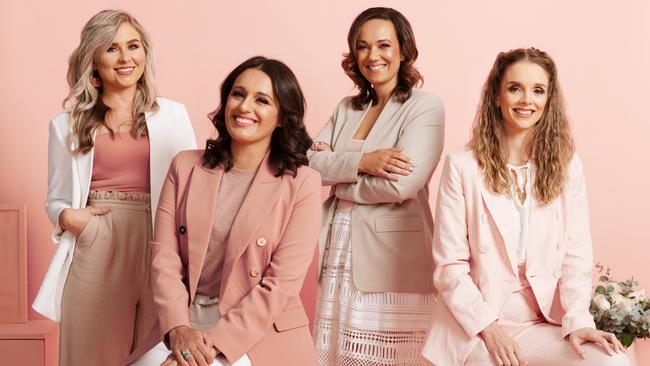
FUTURE FOCUSED
Kindship, as a business, is now a team of 16 (including a 10-member tech team based in Nepal, some of whom will be moving to Australia).
That, however, is just a start. They hope to eventually employ upwards of 150 people.
They’ve this year received a $360,000 South Australian government grant to launch and scale their business under the Seed-Start program.
The app was launched in April – on World Autism Day – and already has 800 parents using it, with most spending about an hour a week connecting with other parents and supports.
Petrosius says they’ll use the funding to help with the national launch and scale of their app, with the company’s first objective to reach 10,000 active weekly users by year’s end.
“A lot of what we’ve achieved so far has just been word of mouth,” she says.
Deputy Premier and Industry, Innovation and Science Minister Susan Close is a fan, saying Petrosius and her team are helping “drive innovation and create jobs and opportunities”.
“The founders have, through personal experience, identified a current gap in the support available for families of South Australians with a disability, and are using new technology to fill this gap and foster a helpful online community,” Close says.
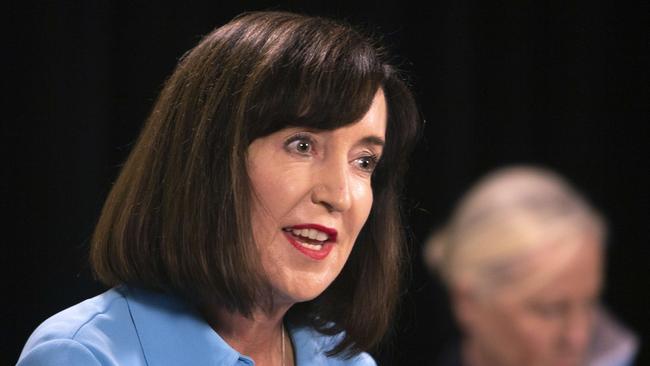
It’s the culmination of a ton of work for Petrosius and her team, but also vindicates her and Andrius’s decision to relocate to South Australia in 2019.
“We were very lucky. My husband was on a business tourist visa and we happened to meet an entrepreneur who said you should apply for the South Australian entrepreneurial visa (business migration; he has since received his full visa)” she says.
“My husband is tied to that and we had to have a sponsor here, and that was accepted.
“So we moved as part of that, which we’re very happy with.”
From there, the couple immersed themselves in the growing entrepreneurial culture at Lot Fourteen, calling the start-up HQ “Stone and Chalk” home, connecting with experts in the field such as finance and law and marketing, and tapping into the $50m SA Venture Capital Fund.
“It’s just great down there, such a sense of community. I don’t feel like it’s competitive, there’s no, ‘Oh, we won’t tell you when we’ve got a secret’. There’s a lot of communal sharing, which is really great,” she says. “It’s the most incredible thing to be surrounded by entrepreneurs. It’s so motivating.”
From here they’ll also look to build their audience, build their base and look for more opportunities, such as working with government to “create a democratic and decentralised channel where they can actually consult a large group of parents about, for example, what the NDIS reform should actually look like.”
Then there’s the ever evolving technologies and ensuring they are ahead of the curve.
“We do ask what can we do if we harness smart technology, like AI and machine learning with the power of community,” she says.
“You can imagine if we can start crowdsourcing all of the parents that live in South Australia’s experiences when, say, looking for a speech pathologist, we could potentially make that search much, much easier.
“And it will be based on lived experience, not like, you know, a random selection of Google reviews. So I think in that sense, we really have an opportunity to actually empower decision making, which I think people feel quite robbed of at the moment.
“That’s really exciting for us.”
HOW THE APP WORKS
Think of the Kindship app as like a “platonic Tinder”, with match and chat features, says founder Summer Petrosius.
“What you can do is see the profiles of other individual parents, which includes things like their child’s age and diagnosis,” she says.
“Also, some of the parents’ interests, like how they like spending the weekend. A bit of a bio really.
“They can either swipe up to match with that parent or swipe down to skip them.
“And then, if there’s a mutual match, then they have the opportunity to chat in private or start a group chat.”
There is also a community feed and searchable index information.
“So if a parent is sitting in a waiting room waiting for their child to finish therapy, and they have five minutes – they can find the answer to something very quickly,” she says. “It’s basically an indexed library of parent-authored content.”
There are also “audio rooms”.
“Something we found when we were talking to parents was this real sense of – if they could hear each other’s voices, that would just make that connection opportunity that much more special,” she says.
“So our audio rooms are essentially live audio events on the app that parents can join and then different sorts of topics are covered.
“Sometimes it will be a parent sharing their experience. Other times it will just be a walking tour for parents to have a coffee and just chat.
“There’s about 20 of those happening a week and they’re all hosted by different volunteers.”
Beyond the app, they also organise meet-ups across the country.
“Most of them are based around a cafe and coffee that just give parents the opportunity to be able to come together and connect and share and bring their kids and just you know, build that local network for themselves,” she says.




